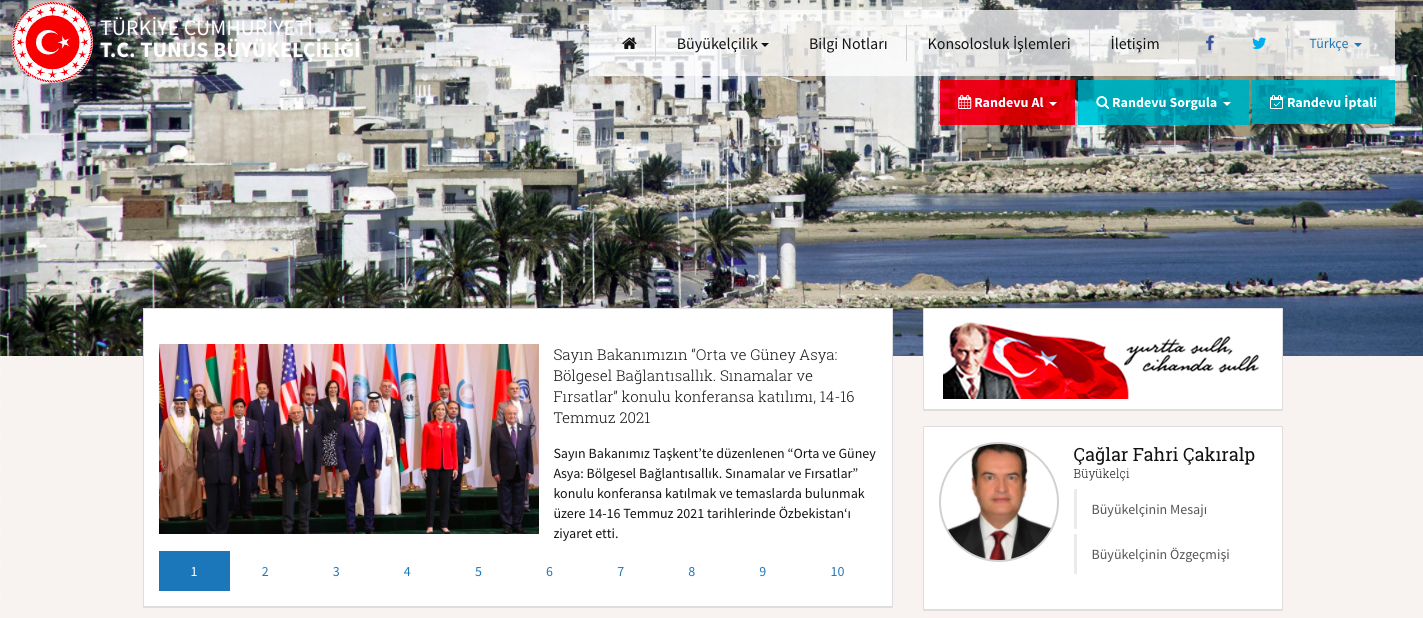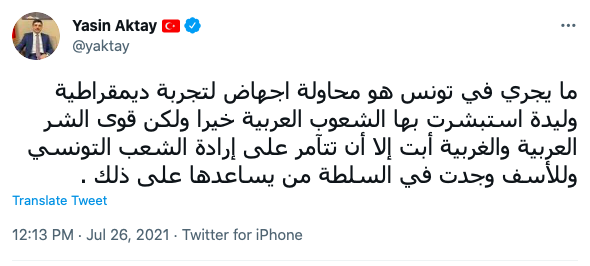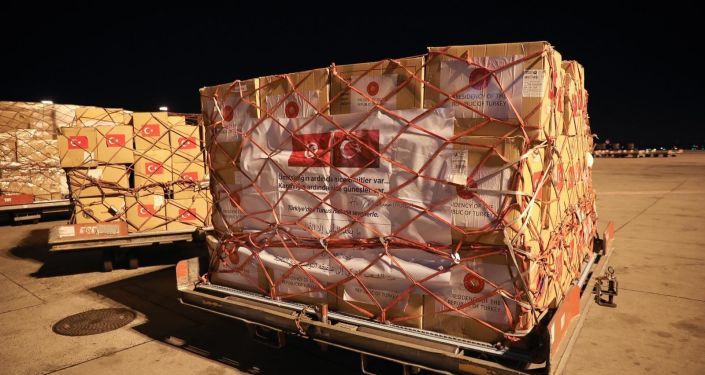Levent Kenez/Stockholm
Turkey’s Islamist government does not want to be in a position that overwhelmingly supports the Tunisian Islamist opposition backed by the Muslim Brotherhood, with which it has deep-rooted ties, seeking to avoid arousing the ire of the Saudis and the Egyptians after the Tunisian president sacked the prime minister and suspended parliament.
On Monday Tunisian President Kais Saied issued a decree that ousted the prime minister and froze parliament, denounced as a coup by the country’s main parties, including the biggest, Ennahda, whose leader, Islamist Rachid Ghannouchi, is a close ally of Turkish President Recep Tayyip Erdoğan.
The first official reaction by Turkey was a press release issued by the Ministry of Foreign Affairs. Compared to previous emotional and undiplomatic releases, the text, which was in carefully written, diplomatic language, said, “The preservation of the exceptional position and democratic achievements of Tunisia which constitutes an exemplary success story in the region in terms of the democratic process carried out in accordance with the expectations of the people, is of great importance for Tunisia as well as for the region.”
The press release, not targeting President Saied, expressed Turkey’s hope that democratic legitimacy would be swiftly reinstated within the framework of the Tunisian constitution.
Interestingly, Turkish Foreign Minister Mevlüt Çavuşoğlu did not share anything on social media about the developments in Tunisia nor did he address the issue when he received Togolese Foreign Minister Robert Dussey yesterday, instead announcing a historic archaeological site in eastern Turkey that has been inscribed on the UNESCO World Heritage List on his personal Twitter account. Çavuşoğlu refrained from commenting on the Tunisia situation despite frequently claiming that Turkey is the leading country and decision-maker in the region.

Much more interestingly, the official website of the Turkish Embassy in Tunis does not contain anything about the latest political crisis in Tunisia. Even the statement made by the Turkish Foreign Ministry was not published on the site during the day. The press release was shared hours later and only on the embassy’s Twitter account. Çağlar Fahri Çakıralp, the newly appointed ambassador to Tunisia, did not say anything about the current developments, either. As unusual, there was no warning for Turkish citizens who intend to travel to Tunisia.
President Erdoğan, who is known for successfully using such incidents in domestic politics, did not make a statement about Tunisia throughout the day. However, it is not difficult to guess that he will bring the Tunisia issue to the agenda at his next meeting with party members, protesting Western countries rather than angering other Arab countries.

In a short statement, not on the official website of the presidency but on his Twitter account, presidential spokesman İbrahim Kalın denounced the suspension of the democratic process in Tunisia and said he hoped Tunisian democracy would emerge stronger from the current crisis.
Another cautious and calm statement early in the day came from the presidency’s Director of Communications Fahrettin Altun, who tweeted, “We are concerned about the most recent developments in Tunisia and maintain that democracy must be restored without delay.”
As Altun also promised in his statement, the state-run Anadolu news agency and TV station TRT aired broadcasts about Tunisia during the day. Contrary to official statements, the government-controlled media openly supported Ghannouchi and the Islamists. “The Tunisian parliament is in session and we adhere to legitimacy and reject the coup,” Ghannouchi told TRT International in a live broadcast.
However, officials in Turkey’s ruling Justice and Development Party (AKP) took a more aggressive stance contrary to the official statements. Party spokesman Ömer Çelik tweeted that “… The suspension of the constitutional order in Tunisia by the president is not legitimate. Those who do this evil to the brotherly Tunisian people are harming their own country.”
Deputy chairman of the party, Islamist Numan Kurtulmuş, said despite the fact that he did not know the developments in Tunisia in detail, “Turkey is against this anti-democratic intervention.”
Yasin Aktay, Erdoğan’s advisor on Turkey’s relations with Arab and Muslim countries as well as the Muslim Brotherhood and other jihadist networks, blamed the West and other Arab countries without naming them. Aktay wrote on Twitter that “What is happening in Tunisia is an attempt to abort a nascent democratic experiment in which the Arab peoples rejoiced, but the Arab and Western forces of evil refused to do anything but conspire against the will of the Tunisian people.”

Nordic Monitor previously published a video interview aired by the Islamist Hilal TV in which Aktay complained about the lack of an international political body that represents all Muslims since the abolishment of the caliphate in Turkey in 1924. He also said Turkey under the Erdoğan government was playing this role in practice by defending oppressed and victimized Muslims.
Turkey’s calm position towards the political developments in Tunisia lies in its intention to distance itself from the Muslim Brotherhood. The organization, which was declared a terrorist organization by Egypt and Saudi Arabia, is seen as an obstacle to repairing the poor relations between Turkey and those countries. Seeing that it was becoming lonesome in the Islamic world, Turkey started negotiations to improve relations with Egypt and Saudi Arabia, which demanded that Turkey take concrete steps. So Turkey asked TV channels affiliated with Muslim Brotherhood that broadcast from Istanbul to dial down their rhetoric.
Turkey in fact does not have a serious problem with the current Tunisian administration. Turkish-Tunisian defense industry cooperation has been boosted in recent years, and Turkey exported $150 million in military equipment to Tunisia last year, including unmanned aerial vehicles (UAVs), various types of armored vehicles, tanker trucks and electro-optical systems. Turkish-made ANKA drones will be delivered to Tunisia next month.

On June 13 a Turkish military plane carrying medical supplies including 50,000 coronavirus vaccine doses, 30 ventilators and an oxygen generator for a 150-bed hospital, 100,000 coronavirus testing kits, 500,000 medical masks, 50,000 sterilized gloves and another 100,000 disposable gloves arrived in Tunisia to help the country in its efforts to combat the spread of the coronavirus. President Saied cited inadequacies in the fight against COVID as one of the reasons for dissolving the government.












